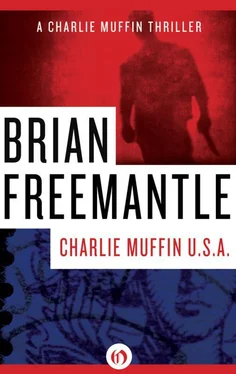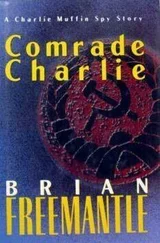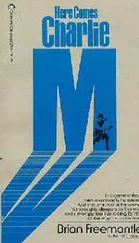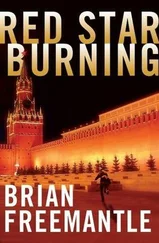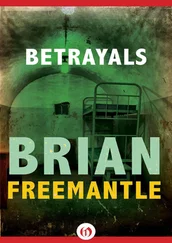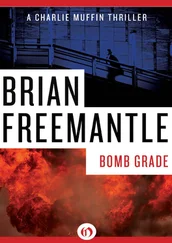Brian Freemantle - Charlie Muffin U.S.A.
Здесь есть возможность читать онлайн «Brian Freemantle - Charlie Muffin U.S.A.» весь текст электронной книги совершенно бесплатно (целиком полную версию без сокращений). В некоторых случаях можно слушать аудио, скачать через торрент в формате fb2 и присутствует краткое содержание. Жанр: Шпионский детектив, на английском языке. Описание произведения, (предисловие) а так же отзывы посетителей доступны на портале библиотеки ЛибКат.
- Название:Charlie Muffin U.S.A.
- Автор:
- Жанр:
- Год:неизвестен
- ISBN:нет данных
- Рейтинг книги:3 / 5. Голосов: 1
-
Избранное:Добавить в избранное
- Отзывы:
-
Ваша оценка:
- 60
- 1
- 2
- 3
- 4
- 5
Charlie Muffin U.S.A.: краткое содержание, описание и аннотация
Предлагаем к чтению аннотацию, описание, краткое содержание или предисловие (зависит от того, что написал сам автор книги «Charlie Muffin U.S.A.»). Если вы не нашли необходимую информацию о книге — напишите в комментариях, мы постараемся отыскать её.
Charlie Muffin U.S.A. — читать онлайн бесплатно полную книгу (весь текст) целиком
Ниже представлен текст книги, разбитый по страницам. Система сохранения места последней прочитанной страницы, позволяет с удобством читать онлайн бесплатно книгу «Charlie Muffin U.S.A.», без необходимости каждый раз заново искать на чём Вы остановились. Поставьте закладку, и сможете в любой момент перейти на страницу, на которой закончили чтение.
Интервал:
Закладка:
Charlie Muffin U.S.A.
Brian Freemantle
Prologue
Tsar Nicholas II of All the Russias and his desperately ill heir, Tsarevich Alexei, had less than three months to live when the specially guarded Imperial prison train arrived at Ekaterinburg on April 30th, 1918.
A year earlier, the Tsar had abdicated in favour of the government that preceded Lenin. In the first few months, under a semblance of a government, respect had lingered for someone whom most Russians regarded as a near-God. By April, the Bolsheviks had taken control. Little respect remained.
In Ekaterinburg, it was predictable. Ekaterinburg is a mining town in the heart of the Urals and from the Urals Lenin had drawn the fiercest support for his revolution. The coming of the Imperial family had been kept secret, but inevitably there had been rumours. The carriage from the station to Ipatiev house, where they were to be held, was jeered at and spat upon and initially the guards were as much to protect them from mob violence as to prevent any rescue attempt.
At the time of his abdication, Tsar Nicholas had been the richest man in the world. Still with him at Ekaterinburg was a train load of personal possessions he had been allowed to assemble. Had he survived the Russian Revolution, the priceless contents of that baggage train would have ensured a life as luxurious as any he had known throughout his fifty years. Among the treasures was a stamp collection. Befitting the world’s richest man, it was worth a fortune, 1,274 items carefully annotated and catalogued in a set of hand-tooled leather albums.
Its creation had been conceived as early as 1907, when Nicholas had decided that three hundred years of Romanov suzerainty should be celebrated by a stamp issue depicting the emperors and empresses of the dynasty. Work had begun in 1909 and at every stage during the four years it had taken to create, the Tsar was involved, making his personal choice of the drawings and the essays and the specimens. It had been issued on January 2nd, 1913, by which time he had already ordered his personal philatelist to prepare for him a unique collection. It included the original drawings and artists’ sketches, the rejected essays, heads and frames, in black and in every other colour that had been attempted, samples of those colour trials, the final design and the projected but unadopted overprint for use in the Grand Duchy of Finland, then under the Tsar’s control. There were also the first prints of every issued stamp, in blocks of four.
The first guard commander for the Tsar, Tsarina and their five children at Ekaterinburg typified both the local feeling and that of the Bolsheviks who had erupted in hatred to overthrow three hundred years of blinkered, misguided Romanov rule. Alexander Avdeyev was a bully and a drunk, a former fitter in a munitions factory who insisted upon eating with the Imperial family and on one occasion elbowed the Tsar in the mouth, stretching across the table to seize some food. Pilfering the royal treasures had started before Ekaterinburg, at Tobolsk, but under Avdeyev’s command the stealing was allowed to go unchecked, at times even encouraged, like a game, because of the distress it caused the Tsar. But five weeks after their imprisonment at Ekaterinburg the stamp collection was intact; those who were stealing were peasants who wore rags and the fine linen and jewellery and silver and gold had more obvious value. Stamps were just pieces of coloured paper.
After three months, Alexander Avdeyev was replaced by Yankel Yurovsky, the regional commissar for justice and a member of the Cheka, the secret police force through which the Tsar had formerly controlled his country. Yurovsky showed the Imperial family more respect and stopped the guards making crude, sexual insults towards the Grand Duchesses Olga, Tatania, Maria and Anastasia. The stealing he didn’t bother about.
By July 14th, 1918, rescue was very close for the Tsar and his family. Headed by two superbly trained and led Czech regiments, the White Russian army had almost surrounded the town. In their cream stucco two-storey house on Voznesenky Avenue, the Imperial family could hear the constant crump of artillery, hourly getting nearer. It was audible, too, in Room Three of the Hotel America which was the Cheka headquarters and where Yurovsky sat in permanent emergency session with three other members of the Ural Soviet. Alexander Beloborodov, the chairman of the Soviet and the man who had received the Tsar, his family and the treasures in April, nearly always controlled the meetings. His deputy, Alexei Chutskayev, had dealt with the British enquiries over the Tsar’s fate and was frequently asked his opinion about foreign concern for the family, particularly for the German-born Tsarina, Alexandra. The fourth man, Chaya Goloshckokin was the regional commissar for war who had just returned from Moscow after meetings with Lenin and Trotsky about what to do with their royal prisoners.
On July 16th, Tsar Nicholas, just fifty, and his haemophiliac son, Alexei, just fourteen, were shot and bayoneted to death. In the early-morning darkness, the Tsarina and her four daughters were taken from Ipatiev house to a railway station on the outskirts of the town and put aboard a shuttered carriage which took them two hundred miles north-west of Ekaterinburg, to the provincial capital of Perm, where they were kept isolated from everyone, their presence never confirmed officially.
As their train left Ekaterinburg, it passed the royal baggage waggons. Some of the locks were already visibly smashed in the scramble to loot the Imperial family possessions which, because of the speed of the Bolshevik retreat, had had to be left behind.
The White Russian officer, who half guessed its importance and believed the Tsar still to be alive, paid three loaves of bread and a packet of salt to retrieve the stamp collection from a disappointed peasant who had thought the album contained bank notes. A Swedish consular official, at the time as ignorant as the officer of the fate of the Tsar, smuggled the stamps to the Latvian port of Riga, for their eventual return to their rightful owner.
It was eight years before they were heard of again. To the surprise of the philatelic world, the Romanov Collection unexpectedly appeared for display and sale in New York in 1926. In the mid-thirties, it was put on exhibition again, this time in a restaurant in London’s High Holborn and then at Selfridges, the Oxford Street store. There, a twenty-four-hour security guard had to be established because of Bolshevik threats to destroy it.
Before the outbreak of the Second World War it again went to New York, once more to be sold. It was broken up, large sections going to individual buyers.
It was not until after the Russian Revolution that the second 925-item collection of proofs and essays of the Imperial collection had been found to exist. Richard Zarrins, Director of the Imperial State Printing Works and the man who had supervised the Romanov issue, formed it from the material left over after the Tsar had had his collection assembled. In 1967 – like the Tsar’s collection before them – the Zanins stamps reached America, to be sold by a New York dealer. After that, like Tsarina Alexandra and her four Grand Duchess daughters forty-eight years before, it vanished.
For the avid philatelist, it is a fascinatingly unique collection. For some, even worth committing crime to possess.
1
On the day that his attempted destruction began, Giuseppe Terrilli ordered the killing of three people. One had to be allowed to die slowly, as an example to other recruits who were not careful enough. It took five hours, for the last two of which the man became insane. It was a good example.
Terrilli, who was 1,500 miles away on his Miami estate, lunched in his customarily spartan manner; just cottage cheese, salad without dressing and mineral water. Not once did he think of the people who were dying. It was a business matter, being satisfactorily resolved and therefore no longer necessary for any further consideration. Giuseppe Terrilli regarded such detachment as essential for the business he conducted.
Читать дальшеИнтервал:
Закладка:
Похожие книги на «Charlie Muffin U.S.A.»
Представляем Вашему вниманию похожие книги на «Charlie Muffin U.S.A.» списком для выбора. Мы отобрали схожую по названию и смыслу литературу в надежде предоставить читателям больше вариантов отыскать новые, интересные, ещё непрочитанные произведения.
Обсуждение, отзывы о книге «Charlie Muffin U.S.A.» и просто собственные мнения читателей. Оставьте ваши комментарии, напишите, что Вы думаете о произведении, его смысле или главных героях. Укажите что конкретно понравилось, а что нет, и почему Вы так считаете.
